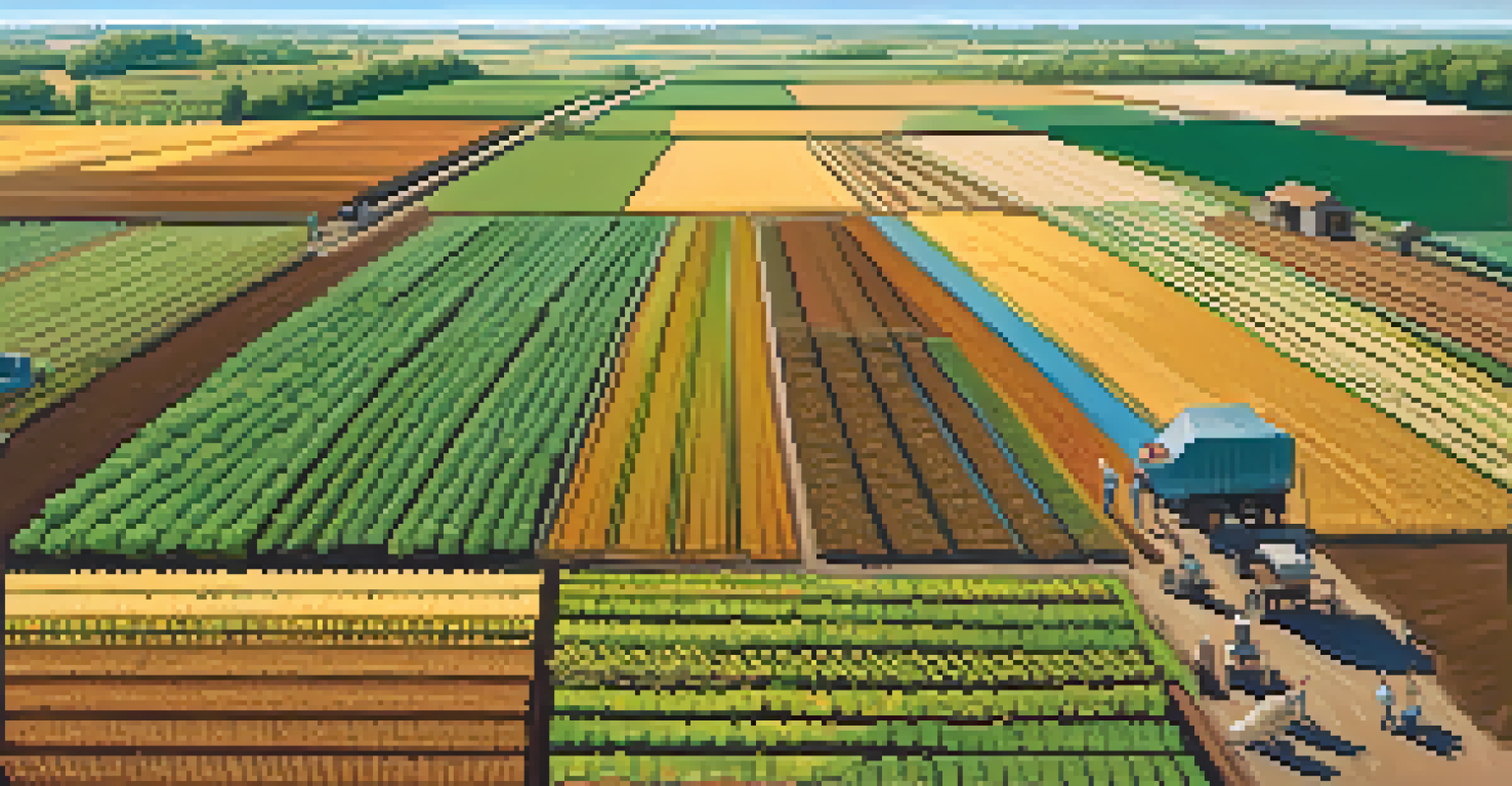How Ethereum Supports Sustainable Agriculture Innovations

Understanding Ethereum's Role in Agriculture
Ethereum, a decentralized blockchain platform, has opened new doors for various industries, including agriculture. By enabling smart contracts, it allows for automated and transparent transactions that can significantly streamline agricultural processes. This means farmers can engage with suppliers, buyers, and even consumers in a more efficient and trustworthy manner.
Agriculture is our wisest pursuit, because it will in the end contribute most to real wealth, good morals, and happiness.
For example, imagine a farmer who grows organic vegetables and wants to ensure his produce reaches consumers directly. Through Ethereum's smart contracts, he can set terms for sales that automatically execute when conditions are met, like delivery times or payment confirmations, removing the need for intermediaries.
This not only reduces costs but also fosters a direct connection among all stakeholders in the supply chain, making the entire agricultural process more sustainable and reliable.
Enhancing Supply Chain Transparency
One of the biggest challenges in agriculture is ensuring transparency within the supply chain. With Ethereum, every transaction is recorded on a public ledger, making it easy to trace the origin of products. This transparency builds trust among consumers who increasingly prefer to know where their food comes from and how it is produced.

For instance, blockchain technology can track a product from farm to table, providing consumers with detailed information about the farming practices used. This level of transparency can help promote sustainable practices, as consumers are more likely to support brands that prioritize ethical sourcing.
Ethereum Boosts Agricultural Efficiency
By enabling smart contracts, Ethereum streamlines transactions in agriculture, fostering direct connections among farmers and consumers.
Moreover, this traceability can also help farmers identify and rectify inefficiencies in their supply chain, leading to better resource management and reduced waste.
Smart Contracts for Sustainability
Smart contracts on the Ethereum platform can facilitate a range of sustainable agriculture practices. These are self-executing contracts where the terms are directly written into code, allowing for automation of various processes. For example, farmers can automate payments to suppliers based on the successful delivery of goods, reducing delays and enhancing cash flow.
The future of agriculture is not just about feeding the world, but also about sustainable practices that enhance the environment.
Furthermore, these contracts can incentivize sustainable practices by allocating funds to farmers who meet specific environmental criteria. Imagine a scenario where farmers receive bonuses for using eco-friendly methods or for maintaining biodiversity on their farms.
This not only encourages sustainable practices but also aligns financial incentives with environmental goals, creating a win-win situation for farmers and the planet.
Data Sharing for Better Decision Making
Ethereum's decentralized nature allows for seamless data sharing among farmers, researchers, and agricultural organizations. This shared data can include weather patterns, soil health metrics, and crop yields, empowering farmers to make informed decisions. For instance, a farmer can analyze historical data on crop performance and adjust planting strategies accordingly.
Moreover, this collective intelligence can lead to innovative solutions for common agricultural challenges, such as pest control or resource allocation. By collaborating and sharing insights, farmers can adopt more effective and sustainable practices.
Enhancing Transparency in Supply Chains
Ethereum's public ledger allows for traceability of products, building consumer trust and promoting sustainable practices.
Ultimately, leveraging shared data helps create a more resilient agricultural ecosystem, where everyone benefits from enhanced knowledge and resource management.
Tokenization of Agricultural Assets
Tokenization, the process of converting real-world assets into digital tokens on a blockchain, is gaining traction in agriculture. Through Ethereum, farmers can tokenize their assets, such as land or equipment, making it easier to secure funding or investment. This can be particularly beneficial for small-scale farmers who often struggle to access capital.
For instance, a farmer could create tokens representing a portion of their upcoming harvest and sell these tokens to investors. This provides upfront capital to the farmer while offering investors a share in the future profits.
By democratizing access to funding, tokenization can empower more farmers to invest in sustainable practices and technologies, ultimately leading to a more sustainable agricultural sector.
Community Engagement and Empowerment
Ethereum is not just a technology; it's also a platform for community building and empowerment in agriculture. Initiatives powered by Ethereum can foster collaboration among farmers, consumers, and organizations focused on sustainability. For example, local farming cooperatives can use Ethereum to manage resources collectively, share knowledge, and promote local produce.
This sense of community can lead to greater support for sustainable practices, as members hold each other accountable and share success stories. Moreover, consumers can directly engage with farmers through platforms built on Ethereum, strengthening the local food movement.
Tokenization Empowers Small Farmers
Tokenization on Ethereum helps farmers secure funding by converting assets into digital tokens, making capital more accessible.
In essence, Ethereum enables a community-driven approach to agriculture that values sustainability and collective growth.
Challenges and Future Potential
While Ethereum offers numerous benefits for sustainable agriculture, there are challenges to consider. Issues like scalability and energy consumption associated with blockchain technology need to be addressed to ensure its long-term viability. However, ongoing developments in Ethereum 2.0 aim to tackle these concerns, promising a more efficient and eco-friendly platform.
As the agricultural sector continues to evolve, the integration of blockchain technology can play a pivotal role in shaping a more sustainable future. Innovations that emerge from Ethereum's capabilities could redefine traditional agricultural practices, making them more efficient and environmentally friendly.

Looking forward, the potential for Ethereum in agriculture is vast, and as more farmers adopt these technologies, we may witness a significant shift towards sustainable practices that benefit both people and the planet.